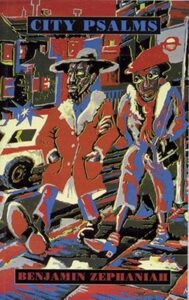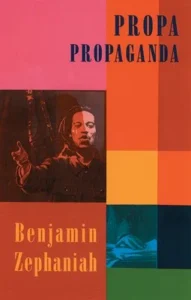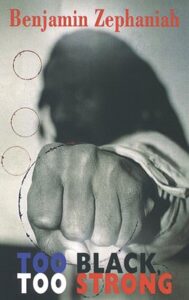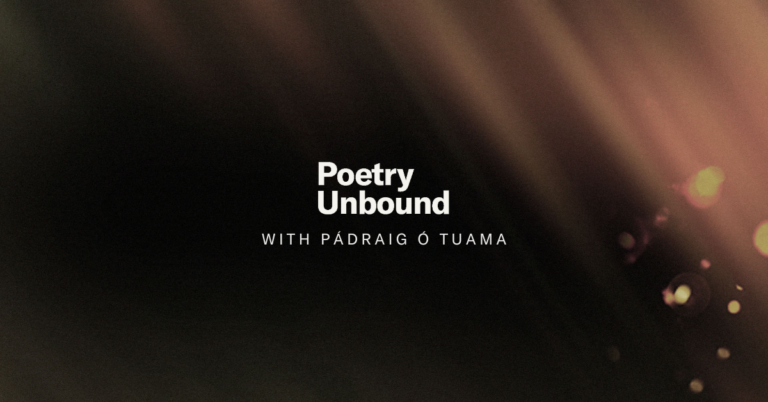Benjamin Zephaniah
To Michael Menson
Benjamin Zephaniah’s urgent, imperative “To Michael Menson” was written when he was a poet in residence at a human rights barrister in England. His poem resonates with his repeated calls for justice for a murdered Black musician — not a justice that is gullible, impotent, or hopeless but one that is clear-eyed, collaborative, and mighty.
We’re pleased to offer Benjamin Zephaniah’s poem and invite you to subscribe to Pádraig’s weekly Poetry Unbound Substack newsletter, read the Poetry Unbound book, or listen to past episodes of the podcast. Order your copy of Kitchen Hymns (new poems from Pádraig) and 44 Poems on Being with Each Other (new essays by Pádraig) wherever you buy books.
Guest
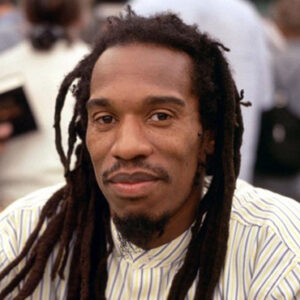
Benjamin Zephaniah was born and raised in Birmingham, England. He is the author of several collections of poetry, including City Psalms, Propa Propaganda, and Too Black, Too Strong. In 2000, he was poet in residence for the chambers of human rights barrister Michael Mansfield, where he worked on numerous cases, including the murder of Stephen Lawrence. Zephaniah appeared on the TV show Peaky Blinders and is also known for his poetry books for children.
Transcript
Transcription by Alletta Cooper
Pádraig Ó Tuama: My name is Pádraig Ó Tuama, and I’m fascinated by how different professions carry with them very different vocabularies. I’ve got a friend who is a builder, and he was saying to me that what he really wants to do is to write poems. But I was saying to him, What an amazing resource and archive of vocabulary he’ll have about building that hardly any other poet would know how to include. Other friends of mine who work in law have not only precise legal language but also the approach to language that legal terminology seems to imply that each sentence can only be understood with one particular meaning, which is almost like the antithesis to a poem where you’re hoping to write something that can have multiple meanings.
Benjamin Zephaniah, a great British poet who died in 2023, was poet in residence with a human rights barrister. And he has written about a lot of horrific circumstances of murders of Black people in London, and also then the failures of systems of governance, systems of policing, to respond properly and adequately to that. And what he does in some of these poems is incorporate legal language into the poetry, like this poem, “To Michael Menson” by Benjamin Zephaniah.
[music: “The Edge of All There Is” by Gautam Srikishan]
“There must be some light somewhere
There must be a true other,
There must be more than despair
There must be more my brother,
There must be so much unsaid
There must be an informant,
There must be some truth ahead
There must be a judgment.
“There must be a little hope
There must be a truth culture,
There must be ways for us to cope
There must be a just future,
There must be somewhere to go
There must be some movement,
There must be much more to know
There must be a judgment.
“There must be ears for our appeal
There must be some progress,
There must be a better deal
There must be more than dis mess,
There must be ways, there must be means
There must be some acknowledgement,
There must be honest go-betweens
There must be a judgment.
“It may take God, it may take man
It may take lords of fire,
It may take burning Babylon
It may take something higher,
It may take bad rebellious youth
It may take a sane government,
It may take liars with the truth,
But there must be a judgment.”
[music: “Kindling” by Gautam Srikishan]
Benjamin Zephaniah is a renowned poet from Britain. And he is a writer of so many genres as well as a musician and a campaigner. His father was from Barbados, his mother from Jamaica. He was born in Birmingham in England, and he called Birmingham “The Jamaican capital of Europe.” He also was an actor. He played the street preacher, Jeremiah Jesus, in “Peaky Blinders” for anyone who’s watched that.
He was also poet in residence at the chambers of the human rights barrister Michael Mansfield in England for a number of years. And it was during that time, it seems, that this poem was written. He also wrote a lot about the investigation that happened after the murder of Stephen Lawrence, who was an 18-year-old Black Londoner who’d been murdered in a racial attack in 1993, and the investigation of which was found to have been completely lacking. And then also this incident with Michael Menson.
Michael Menson was a musician, just like Benjamin Zephaniah, and he was murdered in 1997. He’d been set alight, and it took a period of time between that atrocious, murderous attack and when he died, during which time he had given testimony to say that this had been an attack, that the police didn’t believe him. And his family were the ones who pursued and pursued and pursued justice. And Benjamin Zephaniah was working alongside a whole bunch of these cases where crimes against people of color were not taken as crimes. And where police collusion and corruption were really needing to be investigated in order that the lives and the deaths of Black people in Britain could be honored with a sense of justice that was justly deserved.
[music: “Creatures of Myth” by Gautam Srikishan]
I look at the poem and see the repetitions within it. They occur to me as some kind of manifesto for law. “There must be,” “there must be,” “there must be” — 26 times. Sometimes it seems to me that he’s taken the “let there be” that you get in English translations of the Genesis poem of creation, and he’s trying to apply that now to the city, the brutal city, and trying to say, “there must be,” “there must be.” It’s absolutely declarative. It’s imperative. And repeated four times: “There must be a judgment.”
And I found myself thinking, I think I know what judgment means and what judge means, but I wanted to look it up. It can mean to examine, as well as to pronounce and to rule and to decide, as well as to condemn, and to state categorically or finally. And I suppose what the poem is imagining is that there must be a judgment that examines and rules, decides, and offers condemnation where it needs to be condemned, even if that’s going to cause people to have to examine their own hallways of judgment. That judgment doesn’t just go in one direction. Judgment, if it’s to be pursued, needs to be allowed to be pursued in all the directions it takes you.
The last stanza has the repetition, not of “There must be. There must be. There must be.” It has an eightfold repetition of “It may take.” And it’s saying how demanding that this is going to be for judgment to be pursued. I love the way that it escalates and highlights things that seem beyond us and then says it might be even more than that. “It may take God, it may take man / It may take lords of fire, / it may take burning Babylon, / It may take something higher.” And then it turns, “It may take bad rebellious youth / It may take a sane government, / It may take liars with the truth.” And I like how what he’s speaking to here is the ways within which predictable lines of blame can occur in the way that we talk about whatever the problems of our big cities are, “bad rebellious youth.” And the fact that, too, sometimes as you’re pursuing justice, you might need to keep company and might need to learn from those from whom you do not wish to learn. “It may take liars with the truth.” And then the final line of the final stanza returns to the echo of what has ended all previous stanzas up until now: “But there must be a judgment.”
[music: “Catching Water” by Gautam Srikishan]
Legal language comes across hugely throughout this poem. References like “informant,” “truth culture,” “just future,” “appeal,” “deal,” “honest go-betweens” as well. And not only is there legal terminology, there’s also, I suppose, what I’d call pastoral terminology toward family members who might be appealing for some kind of way within which justice and a judgment can also come with some relief. He says, “There must be more than despair.” “There must be ways for us to cope.” I think there’s so much knowledge about the long ache not only of living with a terrible crime of this murder of Michael Menson and all of the other people whose trials Benjamin Zephaniah worked on, but also the torture that it is for families as they live with their grief and also live with the living grief of justice being denied, and a proper trial being granted to the life and the dignity of the one that they’re grieving over.
[music: “Catching Water” by Gautam Srikishan]
“To Michael Menson” by Benjamin Zephaniah
“There must be some light somewhere
There must be a true other,
There must be more than despair
There must be more my brother,
There must be so much unsaid
There must be an informant,
There must be some truth ahead
There must be a judgment.
“There must be a little hope
There must be a truth culture,
There must be ways for us to cope
There must be a just future,
There must be somewhere to go
There must be some movement,
There must be much more to know
There must be a judgment.
“There must be ears for our appeal
There must be some progress,
There must be a better deal
There must be more than dis mess,
There must be ways, there must be means
There must be some acknowledgement,
There must be honest go-betweens
There must be a judgment.
“It may take God, it may take man
It may take lords of fire,
It may take burning Babylon
It may take something higher,
It may take bad rebellious youth
It may take a sane government,
It may take liars with the truth,
But there must be a judgment.”
[music: “Praise the Rain” by Gautam Srikishan]
Chris Heagle: “To Michael Menson” comes from Benjamin Zephaniah’s book Too Black, Too Strong. Thank you to Bloodeaxe Books who gave us permission to use Benjamin’s poem. Read it on our website at onbeing.org.
[music: “Praise the Rain” by Gautam Srikishan]
Poetry Unbound is: Gautam Srikishan, Eddie Gonzalez, Lucas Johnson, Kayla Edwards, Tiffany Champion, Cameron Musar, and me, Chris Heagle.
Our music is composed and provided by Gautam Srikishan and Blue Dot Sessions.
This podcast is produced by On Being Studios, which is located on Dakota land. Open your world to poetry with us by subscribing to our Substack newsletter. For links and to find out more visit poetryunbound.org.
Books & Music
Recommended Reading
The On Being Project is an affiliate partner of Bookshop.org and Amazon.com. Any earnings we receive through these affiliate partnerships go into directly supporting The On Being Project.





